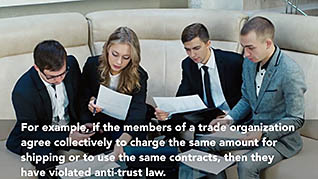Anti-Trust Laws Made Simple
- Product ID
- tabcatls_vod
- Training Time ?
- 12 to 22 minutes
- Language(s)
- English
- Video Format
- High Definition
- Required Plugins
- None
- Number of Lessons
- 8
- Quiz Questions
- 10
- Closed Captioning
- Question Feedback
- Wrong Answer Remediation
- Lesson Bookmarking
- Downloadable Resources



For more than a century, the Sherman Act, the Clayton Act, and the FTC Act have served as the foundation for anti-trust law in the United States. While the Department of Justice and the Federal Trade Commission use these laws to police anti-trust violations, what exactly is an anti-trust violation? Essentially, anti-trust means an unlawful restraint on trade. Businesses use illegal tactics to manipulate their competitive advantage in the marketplace, thus harming the consumer. Parties that commit anti-trust violations face stiff penalties, including imprisonment and fines as high as 100 million dollars or more. Private parties may even sue for triple damages in civil court. This course shows employees what constitutes anti-trust violations, and it gives example of scenarios that may or may not violate anti-trust law.
There are two primary factors to consider when determining if an action violates anti-trust laws: 1) whether the practice has a legitimate business interest, and 2) whether it harms the consumer. Generally speaking, consumers can be harmed by higher prices, fewer choices, and reduced quality or service. This course explains how harm may stem from one corporation monopolizing the marketplace, multiple corporations agreeing not to compete with one another, or other similarly unlawful business practices. You are given additional examples, including conduct when dealing with suppliers, mergers, and trade associations. You are also provided with definitions for key anti-trust concepts such as price fixing, bid rigging, and illegal market divisions.
At the heart of anti-trust considerations is the consumer. While “anti-trust” may initially appear abstract, if you remember this core concept, it becomes easy to understand. If a consumer is harmed by a business decision, anti-trust laws may be violated. Utilize the information presented in this online training to better understand these laws and identify where violations may occur.
![]() This course is in the Video On Demand format, to read about Video On Demand features click here.
This course is in the Video On Demand format, to read about Video On Demand features click here.

- Install on any SCORM LMS
- Full-screen video presentation
- Print certificate and wallet card
- You have 30 days to complete the course
Business leadership
- Overview
- Factors To Consider
- Anti-Trust Violations
- Supply Chain Dealings
- Single Firm Conduct
- Mergers
- Trade Associations
- Conclusion
© Mastery Technologies, Inc.




